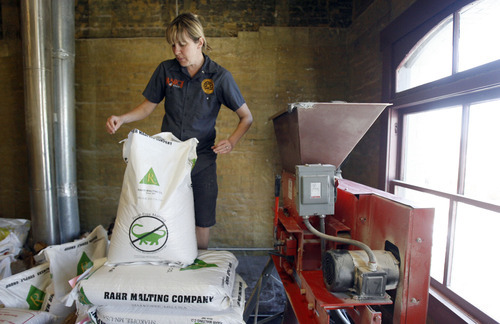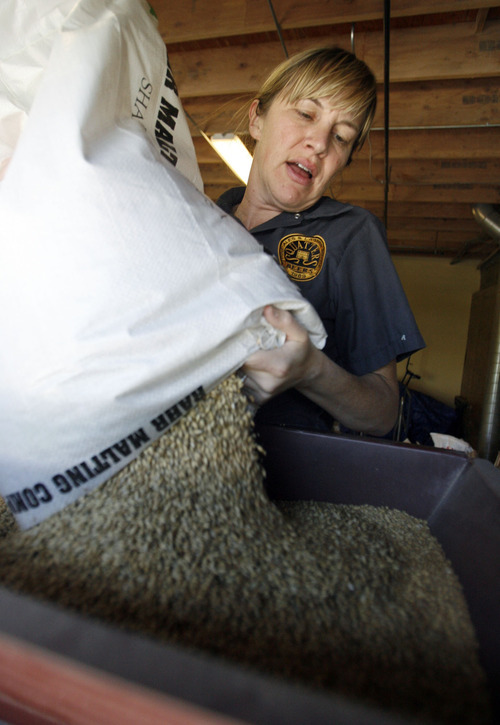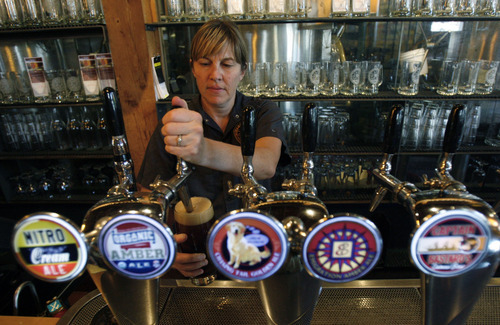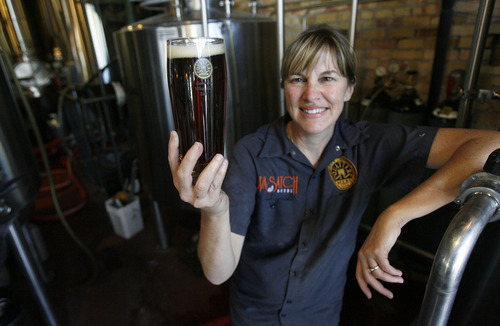This is an archived article that was published on sltrib.com in 2011, and information in the article may be outdated. It is provided only for personal research purposes and may not be reprinted.
Dan Burick remembers first meeting Jenny Talley, a University of Utah student, when she arrived for a job interview to be a brewer at Squatters Pub Brewery.
"She showed up on a mountain bike with a couple bottles of amber ale homebrews in her pack," recalls Burick, now brewmaster at Utah Brewers Cooperative, of the 1991 meeting. "She was passionate and determined to get into the brewing business."
Craft-beer brewing by small independent producers, is a field that, so far, attracts few women because it's so physically demanding. Local beermakers can name maybe three or four other women brewers in the micro-brew industry.
"It's a man's world," explains Kevin Crompton, head brewer at Epic Brewing Company, who has worked with Talley. "There's nothing sexist about it. The work is not just hard on your body, it's hard on you mentally. And there aren't a lot of women who want to put on rubber boots and slop around in a brewery."
But Talley, 42, hasn't only survived in a man's career, she has excelled to earn the title of director of research and development at Squatters, which serves as a lab site for its parent, Utah Brewers Cooperative.
—
'Great industry for women' • This spring, Talley won the craft-beer industry's Schehrer Award for innovation in brewing. She is especially proud that she was selected by the 13 previous winners of the award — all men. "It's a great industry for women," she says.
Burick says: "Jenny has proven you can use brain over brawn in brewing."
Recently, Talley has been experimenting successfully at creating what she calls "funky" Belgian-style beers using wild yeasts. She has also been successful with aging beer in oak barrels.
"There's not a lot of us doing it," Talley says. "I love the creative part of brewing."
—
Beer-friendly roots • To understand where Talley's passion for beer comes from, you only have to look to her roots as the daughter of a Chicago Tribune sportswriter. By 17, Talley was a committed Deadhead. "I used to drink quite a bit of beer from around the country in parking lots outside Grateful Dead concerts," she says.
Talley moved to Utah to pursue a degree in sociology at the U. She was finishing her master's degree in social work and dabbling in home brewing when her career plans changed.
"I saw that Squatters was looking for a brewing assistant and I thought, 'That sounds like a good job,' " she says. Sitting with Squatters' huge stainless-steel tanks behind her, she jokes, "I'm really not working in my field."
Utah, of course, isn't a particularly friendly environment for people who love beer. The state requires beer sold at grocery and convenience stores be no more than 3.2 percent alcohol by weight (that's 4 percent alcohol by volume, the industry standard). In the small-quantity, high-quality craft beer industry, having to meticulously cap alcohol levels is an added challenge to an already complicated process.
"Making good beer at 4 percent APV really hones your skills," Talley says. "There's a lot of beautiful styles at 4 percent alcohol."
In fact, she says, "when you are given a full palette of alcohol, you can use it to hide errors. But there are some styles of beer that can't be honored at [3.2 percent] alcohol level."
Under revised state laws, craft brewers now can make higher alcohol content beer, but only in bottles that must be sold at the brewery or through state liquor stores. Talley has taken that opening and run with it. The proof: Talley's Fifth Element Farmhouse Ale, at 6.75 percent alcohol by volume, is a favorite among local brewers, including Burick, Crompton and Talley herself.
—
Formulator of beer • Other Utah brewmasters have the utmost respect for Talley's uncanny sense of taste and her knowledge.
"She is an incredible formulator of beer," Burick says. "She has a trained palate. She knows her beer styles and she can take a beer from research to production. She has drunk a lot of beer styles to get that judgment."
Making great beer in any quantity, Burick explains, requires overcoming a myriad of problems in the brewing process.
"Jenny has a knack for solving problems," he says, using her foray into the complexity of barrel aging with so-called wild yeasts as an example. "She has learned to manage microbes to get the flavor she wants in her barrel-aged beers," Burick says.
"She thinks outside the box, producing styles that were never produced in the state," Crompton says. "Her reputation isn't just in Utah. She's respected and known around the country."
Talley's newest creation, Big Cottonwood amber ale, is due out July 1. Last week, the brewmaster sent an update: "Just tasted the freshly filtered Big Cottonwood out of the beer tank and it put a smile on my face."
facebook.com/sltribremix —
The art of brewing
Words and pictures are one thing, but if you really want to get to know brewmaster Jenny Talley, taste her beer. Other brewers consider Fifth Element Farmhouse Ale her best to date. Beer is the product of four ingredients: malted barley, hops, water and yeast. But Talley argues that a truly great beer requires a "fifth element," the craft beer brewing community that has shared its secrets with her. The Belgian-style ale, she says, offers "light fruit notes and a champagne-like texture. It finishes slightly tart and refreshing."
—
A classy class with beer in mind
More • If you want to learn more about beer and brewing, you can take a class from Jenny Talley and brewmaster Chris Hass of Desert Edge Pub through the University of Utah's Lifelong Learning.
Info • http://www.lifelong.utah.edu.
Also • Talley is excited about a new frontier of brewing in Utah — pairing beer with food. You can participate by booking a spot in July at the Viking Cooking School http://www.vikingcookingschool.com or in August at http://www.margueritehenderson.com. Warning: Classes fill quickly.









